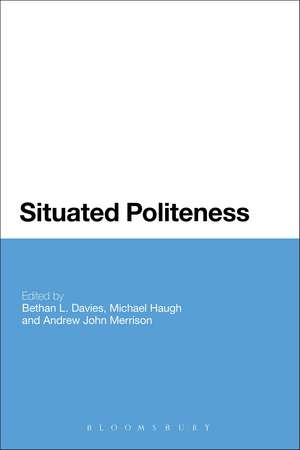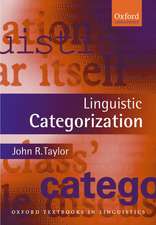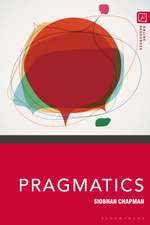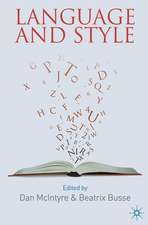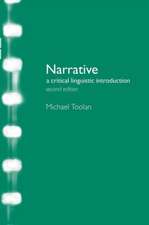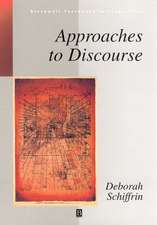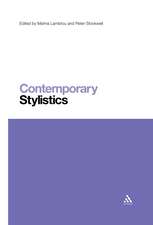Situated Politeness
Editat de Dr Bethan L. Davies, Michael Haugh, Andrew John Merrisonen Limba Engleză Hardback – 18 mai 2011
| Toate formatele și edițiile | Preț | Express |
|---|---|---|
| Paperback (1) | 258.69 lei 6-8 săpt. | |
| Bloomsbury Publishing – 21 noi 2012 | 258.69 lei 6-8 săpt. | |
| Hardback (1) | 1008.43 lei 6-8 săpt. | |
| Bloomsbury Publishing – 18 mai 2011 | 1008.43 lei 6-8 săpt. |
Preț: 1008.43 lei
Preț vechi: 1172.59 lei
-14% Nou
Puncte Express: 1513
Preț estimativ în valută:
192.99€ • 199.37$ • 160.61£
192.99€ • 199.37$ • 160.61£
Carte tipărită la comandă
Livrare economică 25 martie-08 aprilie
Preluare comenzi: 021 569.72.76
Specificații
ISBN-13: 9781441159496
ISBN-10: 1441159495
Pagini: 304
Ilustrații: 1
Dimensiuni: 156 x 234 x 23 mm
Greutate: 0.57 kg
Editura: Bloomsbury Publishing
Colecția Continuum
Locul publicării:London, United Kingdom
ISBN-10: 1441159495
Pagini: 304
Ilustrații: 1
Dimensiuni: 156 x 234 x 23 mm
Greutate: 0.57 kg
Editura: Bloomsbury Publishing
Colecția Continuum
Locul publicării:London, United Kingdom
Caracteristici
Transcends traditional cross-cultural approaches and offers fine-grained analysis of politeness in different texts and settings.
Notă biografică
Michael Haugh is a Senior Lecturer in the School of Languages and Linguistics at Griffith University, Brisbane, Australia. Bethan L. Davies is a Lecturer on Linguistics and Phonetics at the University of Leeds, UK. Andrew John Merrison is a Lecturer in the English Language and Linguistics Department at York St. John University, UK.
Cuprins
1. Situating politeness, Michael Haugh, Bethan Davies, and Andrew John Merrison Part I. Politeness in Institutional Settings 2. Relativity rules: politic talk in ethnicized workplaces, Janet Holmes and Meredith Marra 3. That's not very polite! Discursive struggle and situated politeness in the Mexican English-language classroom, Gerrard Mugford 4. Communities of practice and politeness, Sara Mills 5. Relational work in a sporting community of practice, Jodie Clark Part II. Politeness in Interpersonal Settings 6. Situated functions of addressee honorifics in Japanese television drama, Andrew Barke 7. Do you want to do it yourself like? Hedging in Irish traveller and settled family discourse, Brian Clancy8. Unpacking the hearer's interpretation of situated politeness, Noriko Inagaki 9. Humour, im/politeness and face in getting acquainted, Michael Haugh Part III. Politeness in Public Settings 10. Situated impoliteness: the interface between relational work and identity construction, Miriam Locher 11. Negative politeness features and impoliteness in institutional discourse: a corpus-assisted approach, Charlotte Taylor 12. National face and national face threatening acts: politeness and the European Constitution, Elena Magistro13. Tourist advertising of Australia: impolite or situation-appropriate? Or a uniquely Aussie invite lost intranslation, Angela Ardington 14. Epilogue, Bethan Davies, Andrew John Merrison and Michael Haugh Bibliography Index
Recenzii
For those interested in politeness - which surely includes most of us - this book is essential reading. Covering a range of theoretical approaches, settings, languages and cultures, Situated Politeness explores some of the key issues in current im/politeness research by some of the leading scholars in the field. The book adopts a new three-way division of politeness into institutional, interpersonal and public settings, including a variety of contexts and cultures, such as New Zealand workplaces, classrooms in Mexico a university hockey club in Sheffield, Japanese television drama, and a national advertising campaign in Australia. Particularly significant, Situated Politeness is primarily concerned not only with the local negotiation of both politeness and impoliteness but how these are, crucially, played out against a wider backdrop of social and cultural practices and beliefs. Not least, the style is highly accessible, and the various chapters offer a wide range of relevant and fascinating data.
The idea is, as the editors point out, to disentangle the relationship between pragmatic meaning, social meaning and identity. They do not achieve a final solution (which may be impossible) nor do they steer clear of the complexities of this matter. On the contrary, by drawing on empirical research, the authors present different fine-grained theoretical tools and approaches that, undoubtedly, constitute an advance in this discipline... Very interesting and critically enlightening reading for a specialist who wants to be at the cutting edge of this discipline...Reading Situated Politeness allows for improvement in our comprehension of...complicated concepts. Combining this advancement with the variety of approaches covered in the volume make it an important step forward for the field of socio-pragmatics.
The idea is, as the editors point out, to disentangle the relationship between pragmatic meaning, social meaning and identity. They do not achieve a final solution (which may be impossible) nor do they steer clear of the complexities of this matter. On the contrary, by drawing on empirical research, the authors present different fine-grained theoretical tools and approaches that, undoubtedly, constitute an advance in this discipline... Very interesting and critically enlightening reading for a specialist who wants to be at the cutting edge of this discipline...Reading Situated Politeness allows for improvement in our comprehension of...complicated concepts. Combining this advancement with the variety of approaches covered in the volume make it an important step forward for the field of socio-pragmatics.
